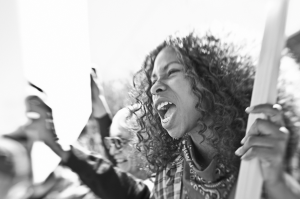This video is part of a series for Everyday Feminism, an online magazine that helps people address the violence, discrimination, and marginalization that they face through applied intersectional feminism.
If you are anything like me, then you’ve often found yourself sitting around asking important life questions such as “Why are we here,” “What is my purpose in life,” and “Is Kim Kardashian a vocal trendsetter?” Well today, dear viewer, we are going to answer this pressing question.
You might associate Kim Kardashian and countless other young women with certain styles of speaking, such as vocal fry or uptalk. These vocal trends are predominantly popular with young women and girls ages 13 to 25. I’m frequently guilty of this as well, but no shame. It happens to the best of us… probably?
You’re most likely familiar with uptalk as “the valley girl” accent. Uptalk is what happens when a person’s vocal inflections rise at the end of a sentence, making it sound like they’re asking a question?
This vocal trend first gained prominence in the 1990s and has since became the butt of many jokes – or more so, the women that adopt it have.
Young women who speak in this way are often criticized for being superficial airheads who rely solely on their father’s credit cards.
However, when other demographics adopt this vocal trend, they receive little to no criticism. For example, George Bush gave a series of speeches in 2005 where he employed the use of uptalk, and no one thought any differently.
Another vocal trend that has risen to prominence in recent years is vocal fry, which is when one lowers their voice to sound deeper and raspier.
Aubrey Plaza, who plays my heroine (and life coach April Ludgate in the NBC show Parks and Recreation), is a frequent vocal fry-er. That’s the technical term for it.
According to the British linguist David Crystal, this style of speaking can be traced back to the early 1960s when English men would use vocal fry as a way to demonstrate superior social standing. It was later brought back into mainstream use by Chicana women in California.
Unfortunately, female celebrities and women in the public eye are often criticized by the media for using these styles of speaking.
For example, Ke$ha and Britney Spears are routinely made fun of in the media for their use of low, creaky tones when they speak in interviews, and even in their music.
Their use of vocal fry is criticized as an indicator of low intelligence, rather than a creative choice to add style to their music. And I don’t know about you, but whatever Ke$ha was doing with her voice in “Timber” was just really doing it for me. Plus, she got a 1500 on her SAT, so she obviously deserves a little more credit than she’s given.
However, these assumptions that we make about people have much bigger real world consequences than just negative press about celebrities.
A study published last May by researchers at Duke and the University of Miami showed that women who use these styles of speaking experience discrimination in job interviews.
According to the study, women who use vocal fry were less likely to be rated as educated, competent, trustworthy, and attractive.
The interviewer was then asked to pick between who they would choose to hire, and when given the choice between someone who used vocal fry and someone who didn’t, they would choose the non-vocal-fryer 86% of the time.
The study also showed that female interviewers have the most negative opinions of women using vocal fry, giving these women the lowest ratings in the study. Do I smell internalized sexism?
It’s pretty clear that vocal trends associated with women, particularly young women, are attributed with negative character traits. However, most modern day linguists believe that this type of thinking is outdated.
According to the linguist Mark Lieberman, changes in speaking styles are usually attributed to younger generations, and women’s vocal trends tend to be half a generation ahead of men’s on average.
It’s not entirely known why this is, but some researchers suggest that women are more sensitive to subtleties in communication and social interaction and therefore more likely to pick up on and pioneer vocal cues.
It could also be that women tend to excel in fields of language and use language to their advantage to be assertive in a culture where they may feel physically or socially dominated by the men around them.
Carmen Fought, a professor of linguistics and author of Chicano English in Context, says, “If women do something like uptalk or vocal fry, it is immediately interpreted as insecure, emotional, or even stupid. The truth is this: Young women take linguistic features and use them as power tools for building relationships.”
While uptalk may be associated with a lack of self-confidence in what the speaker is saying, it’s been theorized by British and Chinese linguists alike that rising tones at the end of sentences actually function to assert dominance and control. Speakers using uptalk assert pressure on the listener to respond and by reminding them of common ground.
Vocal fry is also believed to serve the same linguistic function – to make the speaker sound more authoritative. I like this school of thought because it holds a much more positive view of young women in understanding that they’re actually really inventive and progressive in their use of language, rather than unintelligent and superficial.
Instead of holding age-old sexist biases against young women, it actually seeks to understand the underlying functions of their communication styles.
So what do you guys think: Are uptalk and vocal fry totally uncool or totally inventive and creative? Be sure to leave a comment and like this video if you learned something and subscribe for more videos.




















